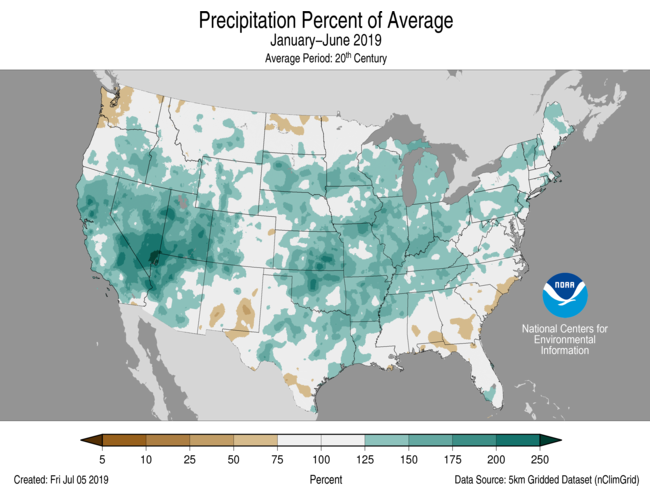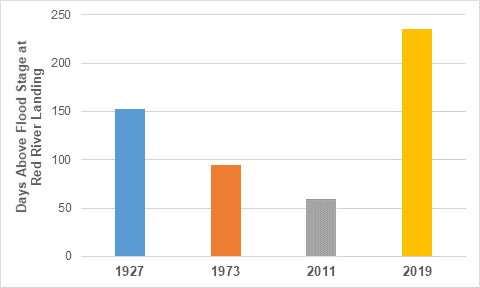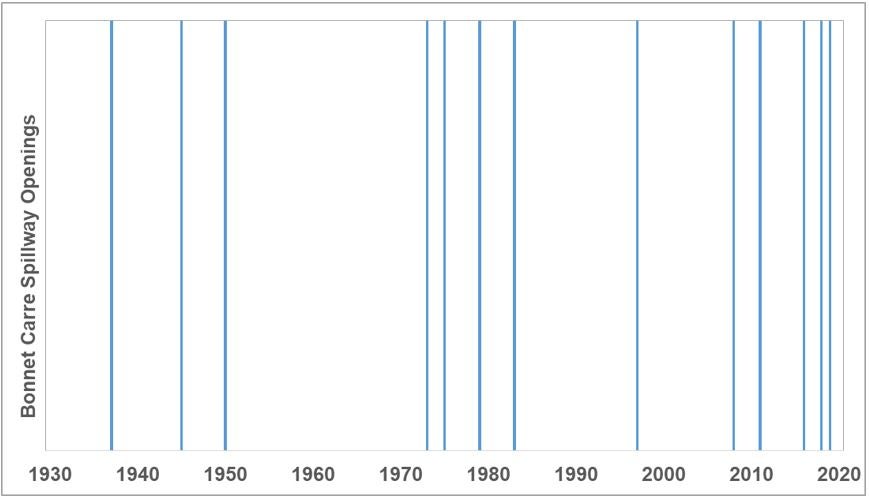5 Reasons Why 2019’s Mississippi River Flood is the Most Unprecedented of Our Time
2019 has been an unprecedented and historic year on the Mississippi River. This year’s flood has broken records set in 1973 and even 1927 – two years with river floods whose impacts are still felt and that shaped how the Mississippi River is managed today.
Since November 2, 2018, the U.S. Army Corps of Engineers (Corps) has been working tirelessly to manage the river’s flood waters and prevent additional flooding to communities across the Mississippi River Valley. While communities upriver have experienced devastating flooding, those in and around Louisiana have been largely protected from flooding as a result of the Mississippi River & Tributaries System. Additionally, globally important shipping traffic along the Mississippi River has continued due to this flood protection system and because of efforts by the U.S. Coast Guard to carefully manage river traffic.
The Mississippi River Valley drains one-third of the continental United States and two Canadian Provinces. So as precipitation increases across this area, additional water flows downriver and through Louisiana.
Here are 5 reasons why this year’s flood on the Mississippi River is the most unprecedented of our time:
Here are 5 reasons why this year’s flood on the Mississippi River is the most unprecedented of our time: http://mississippiriverdelta.org/5-reasons-why-2019s-mississippi-river-flood-is-the-most-unprecedented-of-our-time/ Share on X1. Record precipitation has occurred in the Mississippi River’s Drainage Basin:
Over the last 6 months, precipitation has been as high as 150-250 percent above normal in much of the drainage basin. For a large part of the Midwest, this time period has been the wettest ever recorded in the last 124 years.

2. 2019 is the longest flood of our time:
At 235 days and counting, the Mississippi River has been above flood stage for the longest period in recorded history, surpassing the 1927 flood record of 152 days.
At 235 days and counting, the #MississippiRiver has been above flood stage for the longest period in recorded history, surpassing the 1927 flood record of 152 days.… Share on X–

3. An unprecedented volume of water:
Nearly 210 trillion gallons of water have flowed down the Mississippi River since the start of the year. This volume is 64% greater than the 10-year average.
Nearly 210 trillion gallons of water have flowed down the Mississippi River since the start of the year, which is 64% greater than the 10-year average.… Share on X
4. The Bonnet Carré Spillway’s Unprecedented Openings:
For the first time in its nearly century-old existence, the Bonnet Carré Spillway was opened twice in back-to-back years. The Corps made history again in May when they opened the structure for a second time in the same year to relieve pressure on levees and prevent devastating flooding to communities across Jefferson, Orleans, St. Bernard and Plaquemines Parishes in southeast Louisiana. This year’s second opening is the 14th opening in the spillway’s history and fourth time in the last four years. Recent analysis shows that the average time between spillway openings has decreased from an average of every 7 years to every 3.8 years since 1929 and is still decreasing.

In addition to opening the Bonnet Carré Spillway, the Corps considered opening the Morganza Floodway for the third time since its construction in the 1950s, when river forecasts predicted the river stage would reach 62 feet at Red River Landing, the structure’s operational trigger. Levee failures in Arkansas and Missouri caused predictions to change and the stage height that would trigger the opening of the Morganza Floodway has not been reached during this river flood.
5. An Unprecedented Length of Time:
In 2019, the Bonnet Carré was open for 123 days. The Corps began closing the structure on July 22nd.

As of March, the Great Flood of 2019 caused an estimated $2 billion dollars in damages, and that number will only rise as more damages are assessed. Particularly as hurricane season starts, communities in and around south Louisiana are hoping that the river recedes quickly. 2019 has been a wake-up call that we must consider how to manage the Mississippi River more holistically to withstand the stress of these frequent flood events, particularly if these high rivers become the new normal.
Furthermore, in addition to water coming down from one-third of the continental United States and two Canadian Provinces, communities across coastal Louisiana also face a future with water coming up from the Gulf of Mexico inching closer every day. We must think beyond simply managing the river for flood protection and navigation and also manage it as a vital resource for restoring Louisiana’s rapidly-disappearing coast.
This post was updated on August 5th, 2019.